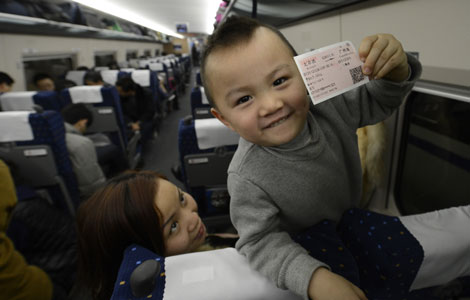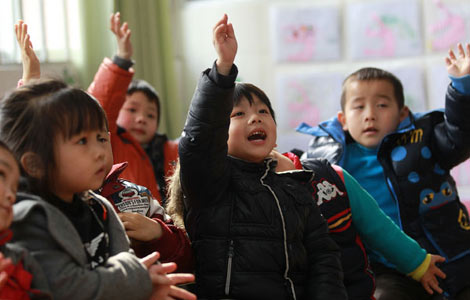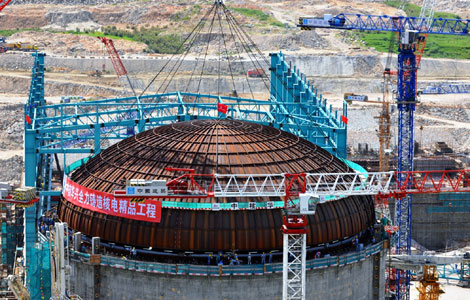China stepping out on world stage
Updated: 2012-12-31 03:45
By Cheng Guangjin (China Daily)
|
||||||||
Participation in multilateral affairs has become a notable feature of China's diplomacy in the past year as the nation, along with other emerging economies, increasingly works toward justice and equity in international order.
As the global financial crisis has exposed the structural and institutional flaws in the world economic system, it has become pressing to have effective global governance with the participation of emerging economies, analysts said.
However, under the current world order, emerging economies do not get enough say despite the important role they play, said Ruan Zongze, deputy director of the China Institute of International Studies.
The GDP of emerging markets (measured by purchasing-power parity) could overtake that of developed economies by 2014, with about 70 percent of total world growth in the next few years coming from emerging markets, more than half of which will be from China and India, Lou Pagnutti, Asia-Pacific area managing partner of Ernest & Young, told Singapore Business Review.
The BRICS countries (Brazil, Russia, India, China and South Africa) are industrializing and urbanizing, and they have great growth potential in infrastructure construction, education and scientific innovation, Ruan said at a forum in Beijing recently.
However, confrontation between Western countries and developing economies arises when the latter try to get more say in international organizations, and such confrontation could endanger achieving effective global governance, Ruan added.
In 2012, China played a constructive role on the world stage.
At the G20 summit held in Mexico in June, China offered $43 billion to the IMF's crisis-fighting reserves, joining other major emerging markets in pledging new funds to support the global financial system.
Developing economies also demanded reforms to give the developing world more clout at the Washington-based Fund.
China has shown strong support for United Nations environmental protection efforts.
At the UN Conference on Sustainable Development (Rio+20 summit) in June, Premier Wen Jiabao announced that China would contribute $6 million to a UN Environment Program trust fund for projects and activities that help developing economies raise capacity for environmental protection.
Wen also promised that China will make available $31.7 million for a three-year international project to help small island countries, the least developed countries and African countries tackle climate change.
More Chinese hold key positions in international organizations, which help broaden developing economies' influence on the world stage.
In May, Wu Hongbo, former Chinese ambassador to Germany, was appointed undersecretary-general for economics and social affairs in the UN, replacing Sha Zukang, another Chinese official. Sha had held the position since February 2007.
China is committed to supporting multilateral organizations in playing an active role in international affairs, President Hu Jintao said in a report to the 18th Party Congress in November.
"We will actively participate in multilateral affairs, support the United Nations, G20, the Shanghai Cooperation Organization, BRICS and other multilateral organizations in playing an active role in international affairs, and work to make the international order and system more just and equitable," Hu said.
As one of the founding members of the Shanghai Cooperation Organization, China hosted the 12th SCO Summit in Beijing in June, and pledged a $10 billion loan to SCO member countries, personnel training and scholarships.
In 2014, China will host the annual Asia-Pacific Economic Cooperation leaders' meeting for the second time, after its 2001 Shanghai summit, which is expected to further promote economic develop in the region and the world.
China has also become a popular destination for international conferences.
China is still in the earliest stages of participating in global governance, and its capacity for global governance is to be improved, said Wu Zhicheng, president of Zhou Enlai School of Government of Nankai University in Tianjin.
To better take up the responsibility in global governance, China should provide more universally beneficial products in such fields as security, finance, public health, global ecological system, and experience in the governance of regional affairs, Wu said.
"This will not only help China build up an image as a responsible, major power, but also satisfy its own needs to be integrated into the current international system and play a constructive role," said Wu.
Since the 1980s, China has joined a number of international organizations, changing its isolation before adopting the policy of reform and opening-up.
Compared with developed countries, China needs to further improve its capabilities in multilateral diplomacy, as it's still a new-comer in international organizations, said Li Dongyan, researcher at the Institute of World Economics and Politics of Chinese Academy of Social Sciences.
The world expects China to play a bigger role and to contribute more in international organizations, such as bridging the gap between north and south and providing more financial support and personnel to international organizations, she wrote in an article published in People's Daily.
"In terms of contribution, the relationship between China and international organizations is mutually beneficial," Li said.
China's own interests are protected and expanded by participating in the formation of international institutions, and China has meanwhile made its due contribution to the development of these international organizations, said Li.
"China should participate more in global governance creatively and in accordance with its capacity," said Wang Yizhou, associate dean at the School of International Studies in Peking University.
China may choose some relatively new areas to get involved in, such as in the ocean, North Pole, outer space and climate change, which still lacks effective global governance, said Wang.
According to Hindu Business Line, China, India, Brazil and other emerging economies will pay more to the UN after the General Assembly approved a five percent increase in its budget for 2012-13 to $5.4 billion in late December.
China's UN fees would increase by 61 percent, taking its share of the budget from 3.2 to 5.1 percent, it said. This makes China the sixth-biggest UN contributor.
However, China's increasing influence in the world has resulted in the popularity of the "China threat" theory.
"This is inevitable, because China is such a big country with rapid economic growth. You cannot stop others from being worried," said Jin Canrong, deputy dean at the School of International Studies at Renmin University of China in Beijing.
"What China should do is enhance coordination with other countries and let other countries share the benefits of its own development," Jin said.
This is just what the Chinese government stressed in November.
In the report to the 18th Party Congress, which is intended as a guideline for future Chinese policy-makers, it says that "China will continue to keep in mind both the interests of the Chinese people and the common interests of the people of all countries."
It also vows to "get more actively involved in international affairs, play its due role as a major, responsible country, and work jointly with other countries to meet global challenges".
"It is very important guidance for China's foreign policy-making in the future, which also represents the trend of the world," said Xia Liping, dean of School of Political Science and International Relations at Tongji University in Shanghai.
China plays a constructive and crucial role in international affairs by adhering to principles and upholding justice, said Vuk Jeremic, president of the 67th Session of the UN General Assembly, during a visit to China on Thursday.
The UN attaches great importance to its cooperation with China and believes China will make greater contributions to world peace, development and prosperity, said Jeremic.
Contact the writer at chengguangjin@chinadaily.com.cn











